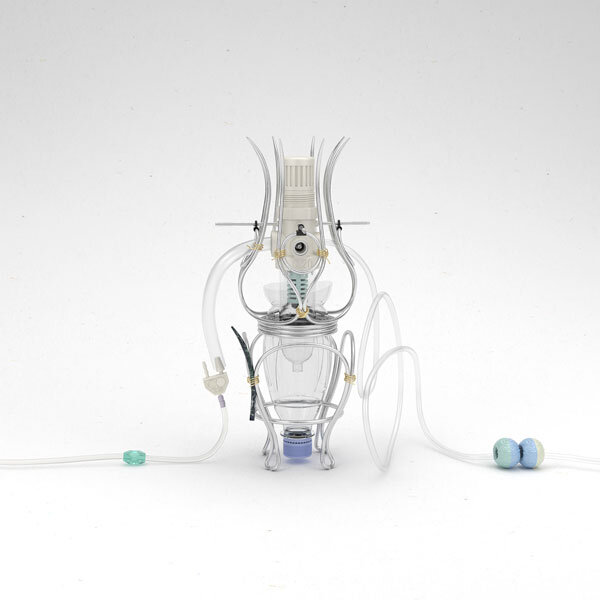To celebrate the release of Eau de Bonjourno, Bernice is hosting a live Q&A and Variety Show on March 4 at 8pm ET via YouTube HERE. Expect special guests, a new live video, and more.
Bernice is the experimental pop vessel of musician/songwriter Robin Dann and her longtime collaborators Thom Gill (keyboards, guitar), Philippe Melanson (e-percussion and drums), Daniel Fortin (bass) and Felicity Williams (voice). Their upcoming record, Eau de Bonjourno, arrives nearly three years on from the release of their Polaris Music Prize-nominated 2018 LP Puff: In the air without a shape (for Bernice a rapid turnaround by comparison to the seven-year gap between their 2011 debut and Puff). It marks their first collaboration with producer Shahzad Ismaily, the acclaimed multi-instrumentalist who has worked with artists as varied as Laurie Anderson, Lou Reed, Elvis Costello, Iggy Pop, John Zorn, and Bonnie ‘Prince’ Billy. While their genre reconstruction remains distinctly Bernice, Dann’s lyrics bring a newfound focus to storytelling in the present moment, compassionately meeting ourselves where we are, and finding joy in spaces that are familiar but ever changing.
Eau de Bonjourno, according to Dann, “openly plays with the shape of a pop song,” drawing on the band members’ backgrounds in jazz, subverting rhythmic formulas, and resting in grooves that sit just outside of predictable. Instead of letting instruments take extended solos, the tone is set on opener “Groove Elation” with brief blurts of synthesized sax, patient passages of space, or clusters of beats, tenderly held together by Dann and Williams’ intimate vocals.
The album’s sound is experimental in its truest definition, chopped up like musique concrète and then delicately placed back together with the loving touch of a scrapbook collagist.
“We have an impulse to open doors that you might not expect, and that translates from groove to melody to lyric,” says Dann. “Phil and Thom have this strong aversion to building a beat that sits there in front of you and does exactly what you expect it to do. We come out of so many musical traditions and are trying to make something that’s not a direct descendent of any of them. We’re trying to make the music that feels like us right now.”
The album was written at an artist centre on the Toronto Islands, a short ferry ride from the city across Lake Ontario, over the course of a month in a repurposed school portable. Dann welcomed the band into her writing process over a concentrated time period for the first time, sharpening their focus “with the intention of creating a group of songs that speak to each other and tell a collective story.” Between writing sessions the band would skinny dip and cook, often with Madonna’s personal chef, who Dann says “was at the artist center writing a novel not about Madonna, but not not about Madonna.”
It was this idyllic location where Dann met the feathered friend that inspired “Lone Swan”, a bird who followed her along the beach, or perhaps vice versa. Its subdued, weightless sound and straightforward lyrics of romantic longing were an experiment in themselves, as she attempted to write “a folk song that anyone could sing with a larger than life meaning.” This guiding theme of deconstructing identity is also found in “It’s Me, Robin”. While practicing the ancient Indian principle of ahimsa (non-violence towards herself and all living beings), she speaks to our vulnerability and multiplicity with the belief that “we are always a product of all the people around and who came before us.”
Dann imagines these songs as vessels, inspired by visionary sci-fi author Ursula K. Le Guinn’s book The Carrier Bag Theory of Fiction. Redefining the notion of a creative work from a phallic tool used to inject singular meanings, she now sees them as containers for portals into moods and worlds that are individual to each listener. “You present a basket and then we’re all inside it,” she says. “There’s feeling in it for me, is there feeling in it for you? When it’s done, the basket falls away and we move on to the next. It’s thinking of these songs as one large shape that holds us instead of moving along a linear time-space pathway.”
In late 2019, Bernice traveled to Brooklyn to record the album with Ismaily, who members met through previous collaborations with Sam Amidon and Leif Vollebekk. Like their writing sessions during Dann’s artistic residency on Toronto Island, they aimed to record in a concentrated time period to generate a cohesive sound over 10 days in the studio. With a shared understanding of the language of jazz and a boundless musical imagination, Ismaily brought a fresh, energizing dynamic to the group of musicians who have known each other for fifteen years. “Rather than wasting time by breaking things apart and talking about them, he encouraged us to just keep going,” says Dann. “We embraced things that felt good and didn’t question them.”
Ultimately, it is this playful spirit that continues to guide the music of Bernice. Pulling from their jazz schooled education in improvisation, the five members create ad hoc games to stir their minds at all moments when they’re together. “Big Mato” began from a conversation one morning on Toronto Island when Dann shared the anecdote that her nephew used this term to refer to oversized tomatoes. As they riffed on lyrics about waking up in the morning craving a salad and choosing ingredients, this evolved into a euphemism for love and intimacy. Its delivery is earnest and straight faced, while the song’s feeling remains effervescent.
“I think that’s the only way to make art,” concludes Dann. “If I take myself seriously, nothing good will come of it. I have to come from somewhere that feels like pure imagination, turning off the self-critic, and finding flow. All of those words that artists use a lot to me just mean finding joy. When we make music together, we look for things that make us laugh and groove and that feels great.”






